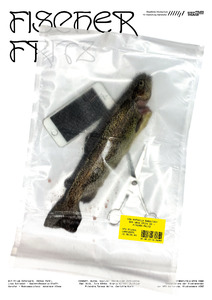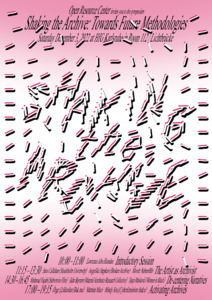Zulfikar Filandra
| Name | Zulfikar Filandra |
3 Inhalte
- Seite 1 von 1
Visitors
- Titel
- Visitors
- Autor/in
- Beschreibung (en)
- “Visitors” takes as its focus the works of international students from HfG Karlsruhe. The exhibition aims to shed light on the different geographical, political and economic backgrounds that come together in our institution. Two main resources for our work will be HfG's archiving platform Madek and its analogue exhibition interface Portal that the HfG Open Resource Center has been developing.
How do people from abroad who study at the HfG shape the place? How do international students contribute to and challenge the HfG? We will work on preparing and realizing an exhibition based on diploma works of international students from previous generations.
For Visitors we have imagined an alternative geography or an alternative biography of HfG. It is designed around people who ‘visit’ and explore what that challenging gesture means.
- “Visitors” takes as its focus the works of international students from HfG Karlsruhe. The exhibition aims to shed light on the different geographical, political and economic backgrounds that come together in our institution. Two main resources for our work will be HfG's archiving platform Madek and its analogue exhibition interface Portal that the HfG Open Resource Center has been developing.
- Typ des Projekts/Werks
- Mitwirkende
- Sprache
- Titel
- Visitors
- Importiert am
- 27.05.2024
- Übergeordnete Sets
- 1
- Set enthält
- 0 0
DNS #69
- Titel
- DNS #69
- Untertitel
- Fischer Fritz
- Autor/in
- Beschreibung (de)
- Frische Fische kann Fischer Fritz nicht mehr fischen. Nicht erst seit seinem Schlaganfall. Sein Sohn Franz ist kein Fischer geworden, sondern Frisör in der Großstadt. Um den Vater zu versorgen hat er eine ausländische Pflegekraft engagiert. Ein Sprechtheater nennt die Autorin Raphaela Bardutzky ihr Stück, das bei den Autor*innentheatertage 2022 am Deutschen Theater in Berlin ausgezeichnet wurde. Sprachlich virtuos, tragisch-komisch und spielerisch leicht erzählt sie von Heimat und Fremde, Sehnsucht und Einsamkeit, Stadt und Land, Alter und Jugend. Im Anschluss findet ein Gespräch mit der Autorin Raphaela Bardutzky statt.
- Beschreibung (en)
- Fisherman Fritz can no longer catch fresh fish. Not just since his stroke. His son Franz has not become a fisherman, but a hairdresser in the big city. He has hired a foreign carer to look after his father. Author Raphaela Bardutzky calls her play, which won an award at the Autor*innentheatertage 2022 at the Deutsches Theater in Berlin, spoken theater. With virtuoso language, tragic-comic and playful lightness, it tells of home and foreignness, longing and loneliness, city and country, age and youth. This will be followed by a discussion with the author Raphaela Bardutzky.
- Typ des Projekts/Werks
- Schlagworte
- Datierung
- 04.02.2023
- Mitwirkende
- Sprache
- Ort: Institution
- Ort
- Großes Studio
- Stadt
- Land
- Beteiligte Institution(en)
- Titel
- DNS #69
- Projektleiter/in
- Semester
- Studiengang
- Lehrveranstaltung
- Importiert am
- 20.12.2023
- Übergeordnete Sets
- 1
- Set enthält
- 0 10
Shaking the Archive
- Titel
- Shaking the Archive
- Titel (en)
- Shaking the Archive
- Autor/in
- Beschreibung (de)
- “…however we define archives, they have no meaning outside the subjective experience of those individuals who, at a given moment, come to use them…” / “On the one hand, there is no state without archives - without its archives. On the other hand, the very existence of the archive constitutes a constant threat to the state.”
Achille Mbembe, The Power of the Archive and its Limits
Weltweit entstehen immer mehr „marginale“, „laterale" oder nicht-institutionelle, selbstinitiierte, informelle und kleine private Archive, die von der Politik öffentlicher Institutionen hinterlassene Lücken schließen und marginalisierten Personen und Realitäten eine Stimme geben. Dabei handelt es sich oft nicht um Archive im eigentlichen Sinne, sondern um Indizes oder kreative Projekte, die mit Materialien und Daten auf neuartige Weise umgehen. Parallel dazu und in Verbindung damit ist eine große Anzahl von forschungsbasierten kreativen Praktiken entstanden, die mit der Aneignung und Neuformulierung archivarischer Methoden arbeiten und damit auf eine Medienrealität im beschleunigten Wandel reagieren. Das Internet und die neuen Medien fordern dazu heraus, neue Sprachen und Methoden des Archivierens zu entwickeln, aber auch eine politisch-strategische, interdisziplinäre Debatte darüber zu führen, was es wirklich bedeutet, Archivmaterial zu teilen beziehungsweise zu kommerzialisieren. Die oben genannten Phänomene: subalterne Archive, forschungsbasierte künstlerische Praktiken und das Aufkommen neuer Medien erschüttern das Archiv – sowohl Inhalt als auch formal – auf unterschiedliche Weise. Gerade der Blick auf kleine und marginale Archivierungsinitiativen lässt uns die heutigen Herausforderungen im Feld der Archive verstehen: das kontinuierliche Aufzeichnen von Ereignissen, das dynamische und autonome Verwalten von Daten, das Dokumentieren und Bewahren möglichst aller Stimmen.
Das Thema des 30-jährigen Jubiläums der HfG Karlsruhe ist "The future of“. Die Zukunft können wir nicht gestalten, ohne uns den gegenwärtigen Fragen der Archivierung des Vergangenen zu stellen. Um unsere Sicht auf die Realität, auf konventionelle westliche Formen des Wissens, der Klassifizierung und der Bewertung in Frage zu stellen, um die jüngste Vergangenheit und ihre materiellen und „immateriellen“ Veränderungen zu dokumentieren, um die vielfältigen und miteinander verknüpften Dringlichkeiten der Gegenwart anzugehen, brauchen wir sowohl das Archiv als auch seine Erschütterungen. Anstatt den Begriff des Fortschritts in Bezug auf die Zukunft allgemein und insbesondere auf die Zukunft des Archivierens zu verwenden, möchten wir die Dimension der Zukunft unter dem Aspekt des Potenzials untersuchen.
Gastredner*innen sind u. a. der Künstler Lawrence Abu Hamdan, die Begründerin des Cyberfeminism Index Mindy Seu, die Direktorin der Villa Romana in Florenz Angelika Stepken und die Wissenschaftlerin Özge Çelikaslan.
- “…however we define archives, they have no meaning outside the subjective experience of those individuals who, at a given moment, come to use them…” / “On the one hand, there is no state without archives - without its archives. On the other hand, the very existence of the archive constitutes a constant threat to the state.”
- Beschreibung (en)
- “…however we define archives, they have no meaning outside the subjective experience of those individuals who, at a given moment, come to use them…” / “On the one hand, there is no state without archives - without its archives. On the other hand, the very existence of the archive constitutes a constant threat to the state.”
Achille Mbembe, The Power of the Archive and its Limits
'Marginal/Lateral’ or non-institutional, self-initiated, informal and small private archives are cropping up across the globe to address gaps and offer a voice to marginalized bodies and realities. These are often not archives in the strict sense of the word, but come in the form of indexes or creative projects that reframe materials and data. Both in parallel and in conjunction, an unprecedented number of research based creative practices, which use appropriation and re-framing (by drawing from the archive or building it) as the basis for their work, and to make sense of a rapidly changing mediatic reality, have also emerged. The added context of the internet and the birth of new media have created the urgency to create a new language and method of archiving, as well for an ethical debate, across different disciplines, around what it really means to share (and often commodify) archival materials. The above fields of enquiry: subaltern archives, research based artistic practices and the emergence of new media are all shaking the archive—both in terms of content and container—in different ways. In order to re-shape our ways of keeping a dynamic record, of sorting and storing data, of preserving all voices, we cannot ignore small scale archival initiatives and attempts.
The theme of HfG’s 30 year anniversary is “the future of” and a future cannot be consciously built without facing a new set of questions around archiving present and past. In order to upend our learned assumptions about reality, about Western forms of knowledge, classification and value; in order to keep a record of the recent past and its material and immaterial transformations; in order to address the multiple, yet interconnected urgencies of the present, we need both the archive and the question, and neither of these ingredients can ever be static. Rather than adopting a notion of progress in relation to the future in general and the future of archiving more specifically, we would like to explore the idea of the future within the framework of potential.
Guests include artist Lawrence Abu Hamdan, Cyberfeminism Index Founder, Mindy Seu, director of Villa Romana in Florence, Angelika Stepken, researcher, Özge Çelikaslan and more.
- “…however we define archives, they have no meaning outside the subjective experience of those individuals who, at a given moment, come to use them…” / “On the one hand, there is no state without archives - without its archives. On the other hand, the very existence of the archive constitutes a constant threat to the state.”
- Typ des Projekts/Werks
- Schlagworte
- Datierung
- 03.12.2022
- Mitwirkende
- Sprache
- Material
- Ort: Institution
- Stadt
- Land
- Bemerkungen
- Titel
- Shaking the Archive
- Semester
- Importiert am
- 01.03.2023
- Übergeordnete Sets
- 1
- Set enthält
- 0 1

